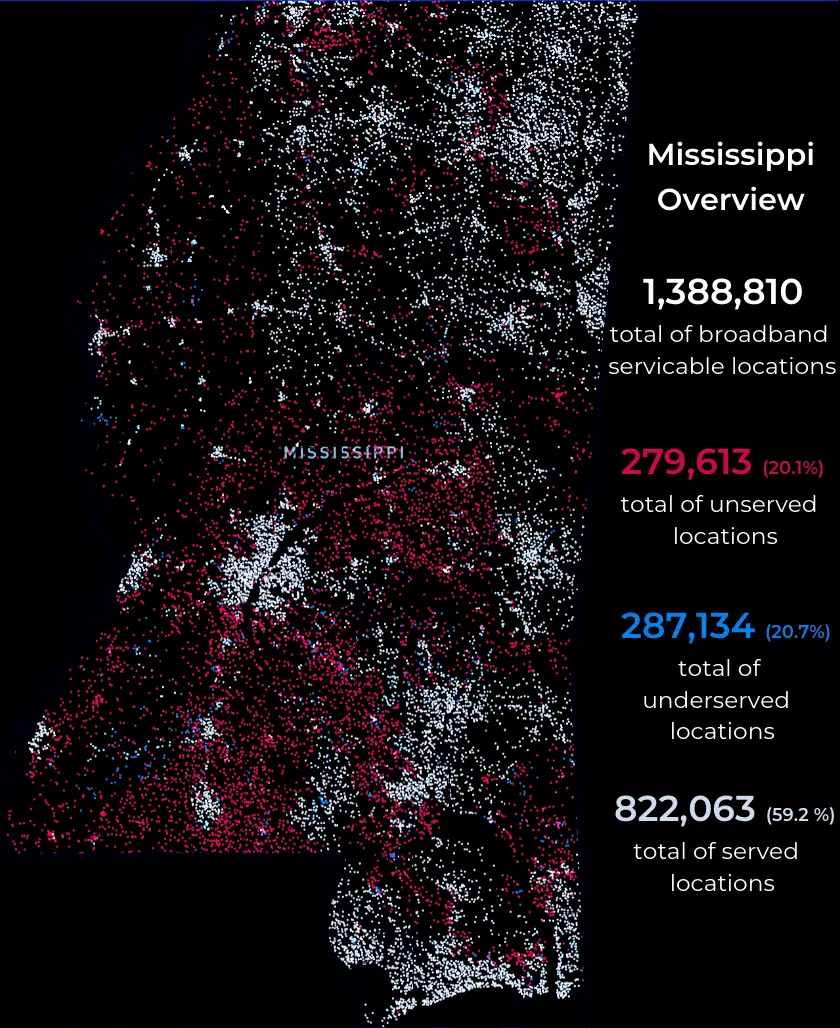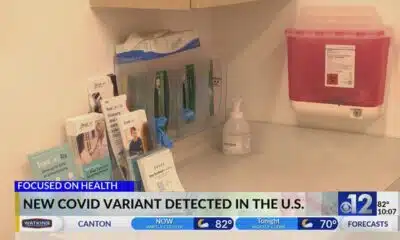Mississippi Today
Two years after funds were obligated to bring high-speed internet to more than 4,000 homes in rural northeast Madison County, zero have been served

Kadiyah Nunn was one of several employees sent to work from home by her job’s management in 2019 when COVID-19 hit Mississippi.
Dependent on her satellite service for an internet connection at her home in rural Sharon in Madison County, Nunn experienced slow internet and static calls to customers, resulting in repeated questions and statements.
After being given two weeks without pay by her employer to look for another internet service, Nunn had no luck. She was let go.
Nunn went eight months without a job and almost had her car repossessed over something she said she “had no absolute control over.”

“It was the most horrific day of my life to lose a good job,” Nunn told Mississippi Today, “not because I did anything wrong – or wasn’t completing my tasks – but because of the internet.”
Two years ago, the Madison County Board of Supervisors approved funding for over 370 miles of high speed internet to cover more than 4,000 homes in the rural northeast areas of Madison County in District 5 – carried out in collaboration with Comcast.
These areas include Camden, Sharon, Pine Grove and some parts of Canton.
As of Aug. 17, zero areas have been covered within this newly estimated $17 million project, said District 5 Supervisor Paul Griffin, president of the Madison County Board of Supervisors.
The original $22 million cost was lowered a month ago after Comcast conducted a walkthrough of where fiber would be installed.
Federal officials have been pouring billions of dollars into the expansion of high-speed internet in Mississippi, yet the tedious process of selecting providers and distributing funds has resulted in a slow rollout.
After receiving no actions and few answers from county officials, residents in the rural northeast portions of Madison County are left wondering when broadband will come to their area.
Griffin said “red tape” – actions the government requires to perform services – have delayed the project’s progress.
“It is not Madison County. It’s been the federal government getting the money down to the local government,” Griffin told Mississippi Today. “The district is waiting on the funds that have gone through the government down to the state, to move from the state down to internet providers.”
Madison County, which received over $20 million in American Rescue Plan Act funds, set aside $10 million for the project but now is contributing half of that. The county applied for a Capital Project Fund aid match through the Broadband Expansion and Accessibility of Mississippi office.
If the county receives the grant, Comcast will also contribute funds up to $7 million to cover the remaining balance, the Board of Supervisors said.
With only partial funds in hand, the project remains at a standstill.
In Madison County, a little over a fifth of the locations in the county are eligible for funding, according to the Mississippi’s broadband office. Of those locations, 73% are unserved areas.
And of the areas unserved, at least half are in the rural northern areas that Griffin said are to be prioritized.
As this delay continues, many of Madison County’s schoolchildren and adults, particularly in the least wealthy parts of the county, can’t access high-speed internet. Griffin’s advice is to just keep holding on.
“There was no future to get the internet at all until two years ago when federal funding started coming down,” Griffin told Mississippi Today. “We’ve held on that long. Hopefully we can hold on for another year.”
In Sharon, nearly all – over 94% – of locations are considered unserved and underserved, according to data collected in 2022.
When it was announced broadband high-speed internet was coming to Nunn’s area, she said she believed the community was progressing and the Board of Supervisors cared about its citizens. But with the prolonged wait, the mother of three says it’s becoming difficult to raise her family in the area she loves and grew up in.
“This is my livelihood. This is how I provide for my family,” Nunn said. “The world is technology now. You need the internet to basically do anything.”
In rural areas like Nunn’s without cable, fiber, or DSL internet access, the commonly served satellite internet providers are Viasat and HughesNet. Satellite internet is the only thing she’s able to get, but these services are not recommended for those who work from home and need high-speed connection.
The 24-year-old said she has satellite internet service with Viasat, but the 100 GB plan package she needs runs $275.45 per month, which is higher than the average cost of satellite service ($100). Nunn said the 100 GB wouldn’t even last her two days before it’s used up and begins to run slow.
“This is becoming too much. People in the Canton area mention to me that I can get Xfinity Internet that’s priced at $10 or $13 per month because I have low income and children,” Nunn continued. “I go to check. But the providers, of course, say that they don’t operate in my area.”
Mapping remains spotty during the process of expanding broadband for residents, especially those in rural communities.

Sally Doty, director of the Broadband Expansion and Accessibility of Mississippi office, said her office is working to develop a new map to be released within the next month or two that will provide an accurate representation of broadband availability across the state.
This map will be funded by the Broadband Equity, Access and Deployment program through Doty’s office out of the $1.2 billion Mississippi will receive to serve approximately 300,000 unserved and 200,000 underserved locations across the state.
Doty said this new map will help the office accurately determine where funding should be allocated and what areas still need to be addressed. It will also help residents determine what services are available to them.
“We are really kind of turning to a new way of keeping up with who has what service in some areas,” Doty continued. “As we do with all of the grants from our office and any grant that we give out, we are going to know the exact location and the addresses where (the awardee) is going to provide service.”
The broadband deployment program will begin its application process after money from the Coronavirus Capital Projects Fund has been dispersed.
A few hours before the application for those funds closed Aug. 17, there were 103 applications and over 100 applications in progress. Of the $356.4 million that providers are asking from Doty’s office, only $162 million will be dispersed.
As more funding is distributed, Doty said the number of unserved and underserved residents will continue to shift.
“We have 268,000 unserved, but I’m not quite sure how many we will serve with this (coronavirus fund) … We hope about 35,000 or more. Then, we’re down to 233,000 unserved, so that gives us more for the underserved,” Doty told Mississippi Today. “It’s a moving target all the time.”
Cynthia Johnson, a Sharon native for over 60 years, saw firsthand the importance of access to high-speed internet for children in rural areas before and after the pandemic.
Johnson has two children, ages 15 and 16, who are required to do virtual learning and submit assignments online. But with no access to high-speed internet at home, the children have missed deadlines to turn homework in by 11:59 p.m.
Johnson said she had to call the school several times to explain their situation and plead for understanding to be granted to her children.
She said she hoped to never experience hurdles like this again and to provide her children with the same educational opportunities as the rest of the county. But because the situation has persisted for so long, she is starting to feel forgotten.
“Everything is prospering and growing around us, except for our area,” Johnson told Mississippi Today. “It makes you feel like you’re in a foreign country.”
People in the community like Johnson also see benefits of working from home, considering the lack of opening positions in the area.
“There are no jobs in Sharon. The closest thing to me would be Canton, but with gas prices, you can’t get very far” Johnson said. “If you have to go 30 miles to at least get a minimum wage, then that’s not benefiting anyone.”
According to Census Bureau data, the average commute time to work in Sharon was 52.5 minutes compared to the state’s average commute time of 25.2 minutes.
Johnson said she doesn’t know how people are supposed to manage with so little resources that help the community to grow economically and socially.
“We have always got the short end of everything out here.” Johnson stated.
MediaJustice, a national grassroots movement aimed at improving communication rights, access, and power for diverse and marginalized communities, seeks to bridge the digital divide – the gap between who benefits from reliable internet connections and who doesn’t.
In early August, the California-based organization submitted a report to Mississippi’s broadband office integrating the stories and recommendations of residents and community leaders in Utica, pushing for internet access and a visit from officials.
“How can (officials) have any sense of what kind of solutions a community wants, if they haven’t even come and told the community about what kind of solutions are possible?” Brandon Forester, the national organizer for internet rights at MediaJustice, told Mississippi Today.

Forester works to help communities see that they can have a role, have agency and make decisions about the technology in their community. Forester said he relied on the power of storytelling to detail the barriers and solutions to broadband access as identified by the experiences of residents of Utica.
“The report was to say these people exist. They’re 45 minutes down the road from the Capitol. These people are completely disconnected,” Forester continued. “And the state doesn’t even realize it.”
Utica, a rural town in Hinds County of around 600 residents, found itself grappling with similar problems as those in rural Sharon: lack of internet access and high internet rates.
Forester said some residents reported not receiving the service they paid for and others required different levels of service needs. Forester said ultimately, a common theme was that the internet was too expensive.

“Part of that is because companies essentially are monopolies. AT&T and HughesNet are not competing for the same customers, so providers are able to put whatever pricing they want on these folks,” Forester said, referring to studies conducted by the Los Angeles Times and The Markup.
In rural communities, assistance can be slow due to multiple factors, but one reason is that internet providers need incentives.
Forester said for large, publicly traded corporations, their incentives may be to maximize profits for shareholders. For Electric Co-Ops – private, nonprofit companies delivering electricity to customers –, their goal may be to connect as many people as possible.
Forester said he thinks about people’s abilities to have telehealth savings, access to education and entertainment, if only rural communities had high-speed internet.
“(MediaJustice) is trying to help people figure out how to organize their resources because it may not be that the right internet solution for one area is the same as it is for another neighborhood,” Forester explained. “It’s not about us saying this is the best thing for someone, but it’s about a community being able to make choices regarding how technology shows up for them.”
This article first appeared on Mississippi Today and is republished here under a Creative Commons license.
Did you miss our previous article…
https://www.biloxinewsevents.com/?p=281532
Mississippi Today
Trump nominates Baxter Kruger, Scott Leary for Mississippi U.S. attorney posts
President Donald Trump on Tuesday nominated Baxter Kruger to become Mississippi’s new U.S. attorney in the Southern District and Scott Leary to become U.S. attorney for the Northern District.
The two nominations will head to the U.S. Senate for consideration. If confirmed, the two will oversee federal criminal prosecutions and investigations in the state.
Kruger graduated from the Mississippi College School of Law in 2015 and was previously an assistant U.S. attorney for the Southern District. He is currently the director of the Mississippi Office of Homeland Security.
Sean Tindell, the Mississippi Department of Public Safety commissioner, oversees the state’s Homeland Security Office. He congratulated Kruger on social media and praised his leadership at the agency.
“Thank you for your outstanding leadership at the Mississippi Office of Homeland Security and for your dedicated service to our state,” Tindell wrote. “Your hard work and commitment have not gone unnoticed and this nomination is a testament to that!”
Leary graduated from the University of Mississippi School of Law, and he has been a federal prosecutor for most of his career.
He worked for the U.S. Attorney’s Office in the Western District of Tennessee in Memphis from 2002 to 2008. Afterward, he worked at the U.S. Attorney’s Office for the Northern District of Mississippi in Oxford, where he is currently employed.
Leary told Mississippi Today that he is honored to be nominated for the position, and he looks forward to the Senate confirmation process.
This article first appeared on Mississippi Today and is republished here under a Creative Commons Attribution-NoDerivatives 4.0 International License.
The post Trump nominates Baxter Kruger, Scott Leary for Mississippi U.S. attorney posts appeared first on mississippitoday.org
Note: The following A.I. based commentary is not part of the original article, reproduced above, but is offered in the hopes that it will promote greater media literacy and critical thinking, by making any potential bias more visible to the reader –Staff Editor.
Political Bias Rating: Centrist
This article presents a straightforward news report on President Donald Trump’s nominations of Baxter Kruger and Scott Leary for U.S. attorney positions in Mississippi. It focuses on factual details about their backgrounds, qualifications, and official responses without employing loaded language or framing that favors a particular ideological perspective. The tone is neutral, with quotes and descriptions that serve to inform rather than persuade. While it reports on a political appointment by a Republican president, the coverage remains balanced and refrains from editorializing, thus adhering to neutral, factual reporting.
Mississippi Today
Jackson’s performing arts venue Thalia Mara Hall is now open
After more than 10 months closed due to mold, asbestos and issues with the air conditioning system, Thalia Mara Hall has officially reopened.
Outgoing Mayor Chokwe A. Lumumba announced the reopening of Thalia Mara Hall during his final press conference held Monday on the arts venue’s steps.
“Today marks what we view as a full circle moment, rejoicing in the iconic space where community has come together for decades in the city of Jackson,” Lumumba said. “Thalia Mara has always been more than a venue. It has been a gathering place for people in the city of Jackson. From its first class ballet performances to gospel concerts, Thalia Mara Hall has been the backdrop for our city’s rich cultural history.”
Thalia Mara Hall closed last August after mold was found in parts of the building. The issues compounded from there, with malfunctioning HVAC systems and asbestos remediation. On June 6, the Mississippi State Fire Marshal’s Office announced that Thalia Mara Hall had finally passed inspection.
“We’re not only excited to have overcome many of the challenges that led to it being shuttered for a period of time,” Lumumba said. “We are hopeful for the future of this auditorium, that it may be able to provide a more up-to-date experience for residents, inviting shows that people are able to see across the world, bringing them here to Jackson. So this is an investment in the future.”
In total, Emad Al-Turk, a city contracted engineer and owner of Al-Turk Planning, estimates that $5 million in city and state funds went into bringing Thalia Mara Hall up to code.
The venue still has work to be completed, including reinstalling the fire curtain. The beam in which the fire curtain will be anchored has asbestos in it, so it will have to be remediated. In addition, a second air-conditioning chiller needs to be installed to properly cool the building. Until it’s installed, which could take months, Thalia Mara Hall will be operating at a lower seating capacity of about 800.
“Primarily because of the heat,” Al-Turk said. “The air conditioning would not be sufficient to actually accommodate the 2,000 people at full capacity, but starting in the fall, that should not be a problem.”
Al-Turk said the calendar is open for the city to begin booking events, though none have been scheduled for July.
“We’re very proud,” he said. “This took a little bit longer than what we anticipated, but we had probably seven or eight different contractors we had to coordinate with and all of them did a superb job to get us where we are today.”
This article first appeared on Mississippi Today and is republished here under a Creative Commons Attribution-NoDerivatives 4.0 International License.
The post Jackson’s performing arts venue Thalia Mara Hall is now open appeared first on mississippitoday.org
Note: The following A.I. based commentary is not part of the original article, reproduced above, but is offered in the hopes that it will promote greater media literacy and critical thinking, by making any potential bias more visible to the reader –Staff Editor.
Political Bias Rating: Centrist
The article presents a straightforward report on the reopening of Thalia Mara Hall in Jackson, focusing on facts and statements from city officials without promoting any ideological viewpoint. The tone is neutral and positive, emphasizing the community and cultural significance of the venue while detailing the challenges overcome during renovations. The coverage centers on public investment and future prospects, without partisan framing or editorializing. While quotes from Mayor Lumumba and a city engineer highlight optimism and civic pride, the article maintains balanced, factual reporting rather than advancing a political agenda.
Mississippi Today
‘Hurdles waiting in the shadows’: Lumumba reflects on challenges and triumphs on final day as Jackson mayor
On his last day as mayor of Jackson, Chokwe Antar Lumumba recounted accomplishments, praised his executive team and said he has no plans to seek office again.
He spoke during a press conference outside of the city’s Thalia Mara Hall, which was recently cleared for reopening after nearly a year of remediation. The briefing, meant to give media members a peek inside the downtown theater, marked one of Lumumba’s final forays as mayor.
Longtime state Sen. John Horhn — who defeated Lumumba in the Democratic primary runoff — will be inaugurated as mayor Tuesday, but Lumumba won’t be present. Not for any contentious reason, the 42-year-old mayor noted, but because he returns to his private law practice Tuesday.
“I’ve got to work now, y’all,” Lumumba said. “I’ve got a job.”
Thalia Mara Hall’s presumptive comeback was a fitting end for Lumumba, who pledged to make Jackson the most radical city in America but instead spent much of his eight years in office parrying one emergency after another. The auditorium was built in 1968 and closed nearly 11 months ago after workers found mold caused by a faulty HVAC system – on top of broken elevators, fire safety concerns and vandalism.
“This job is a fast-pitched sport,” Lumumba said. “There’s an abundance of challenges that have to be addressed, and it seems like the moment that you’ve gotten over one hurdle, there’s another one that is waiting in the shadows.”
Outside the theater Monday, Lumumba reflected on the high points of his leadership instead of the many crises — some seemingly self-inflicted — he faced as mayor.
He presided over the city during the coronavirus pandemic and the rise in crime it brought, but also the one-two punch of the 2021 and 2022 water crises, exacerbated by the city’s mismanagement of its water plants, and the 18-day pause in trash pickup spurred by Lumumba’s contentious negotiations with the city council in 2023.
Then in 2024, Lumumba was indicted alongside other city and county officials in a sweeping federal corruption probe targeting the proposed development of a hotel across from the city’s convention center, a project that has remained stalled in a 20-year saga of failed bids and political consternation.
Slated for trial next year, Lumumba has repeatedly maintained his innocence.
The city’s youngest mayor also brought some victories to Jackson, particularly in his first year in office. In 2017, he ended a furlough of city employees and worked with then-Gov. Phil Bryant to avoid a state takeover of Jackson Public Schools. In 2019, the city successfully sued German engineering firm Siemens and its local contractors for $89 million over botched work installing the city’s water-sewer billing infrastructure.
“I think that that was a pivotal moment to say that this city is going to hold people responsible for the work that they do,” Lumumba said.
Lumumba had more time than any other mayor to usher in the 1% sales tax, which residents approved in 2014 to fund infrastructure improvements.
“We paved 144 streets,” he said. “There are residents that still are waiting on their roads to be repaved. And you don’t really feel it until it’s your street that gets repaved, but that is a significant undertaking.”
And under his administration, crime has fallen dramatically recently, with homicides cut by a third and shootings cut in half in the last year.
Lumumba was first elected in 2017 after defeating Tony Yarber, a business-friendly mayor who faced his own scandals as mayor. A criminal justice attorney, Lumumba said he never planned to seek office until the stunning death of his father, Chokwe Lumumba Sr., eight months into his first term as mayor in 2014.
“I can say without reservation, and unequivocally, we remember where we started. We are in a much better position than we started,” Lumumba said.
Lumumba said he has sat down with Horhn in recent months, answered questions “as extensively as I could,” and promised to remain reachable to the new mayor.
This article first appeared on Mississippi Today and is republished here under a Creative Commons Attribution-NoDerivatives 4.0 International License.
The post 'Hurdles waiting in the shadows': Lumumba reflects on challenges and triumphs on final day as Jackson mayor appeared first on mississippitoday.org
Note: The following A.I. based commentary is not part of the original article, reproduced above, but is offered in the hopes that it will promote greater media literacy and critical thinking, by making any potential bias more visible to the reader –Staff Editor.
Political Bias Rating: Center-Left
The article reports on outgoing Jackson Mayor Chokwe Antar Lumumba’s reflections without overt editorializing but subtly frames his tenure within progressive contexts, emphasizing his self-described goal to make Jackson “the most radical city in America.” The piece highlights his accomplishments alongside challenges, including public crises and a federal indictment, maintaining a factual tone yet noting contentious moments like labor disputes and governance issues. While it avoids partisan rhetoric, the focus on social justice efforts, infrastructure investment, and crime reduction, as well as positive framing of Lumumba’s achievements, aligns with a center-left perspective that values progressive governance and accountability.
-
News from the South - Georgia News Feed6 days ago
Are you addicted to ‘fridge cigarettes’? Here’s what the Gen Z term means
-
News from the South - Oklahoma News Feed7 days ago
RFK Jr. Brings MAHA to Oklahoma
-
Local News7 days ago
St. Martin trio becomes the first females in Mississippi to sign Flag Football Scholarships
-
News from the South - South Carolina News Feed6 days ago
Federal investigation launched into Minnesota after transgender athlete leads team to championship
-
News from the South - Tennessee News Feed5 days ago
Democratic resolution to block military action in Iran fails to advance in US Senate
-
The Center Square5 days ago
U.S. Senate prepares for passage of One Big Beautiful Bill Act | National
-
News from the South - Virginia News Feed7 days ago
‘Hallowed ground, desecrated’: ICE sweeps at Chesterfield court draw fierce backlash
-
News from the South - Florida News Feed6 days ago
US Supreme Court allows SC to remove Planned Parenthood from list of Medicaid providers















































